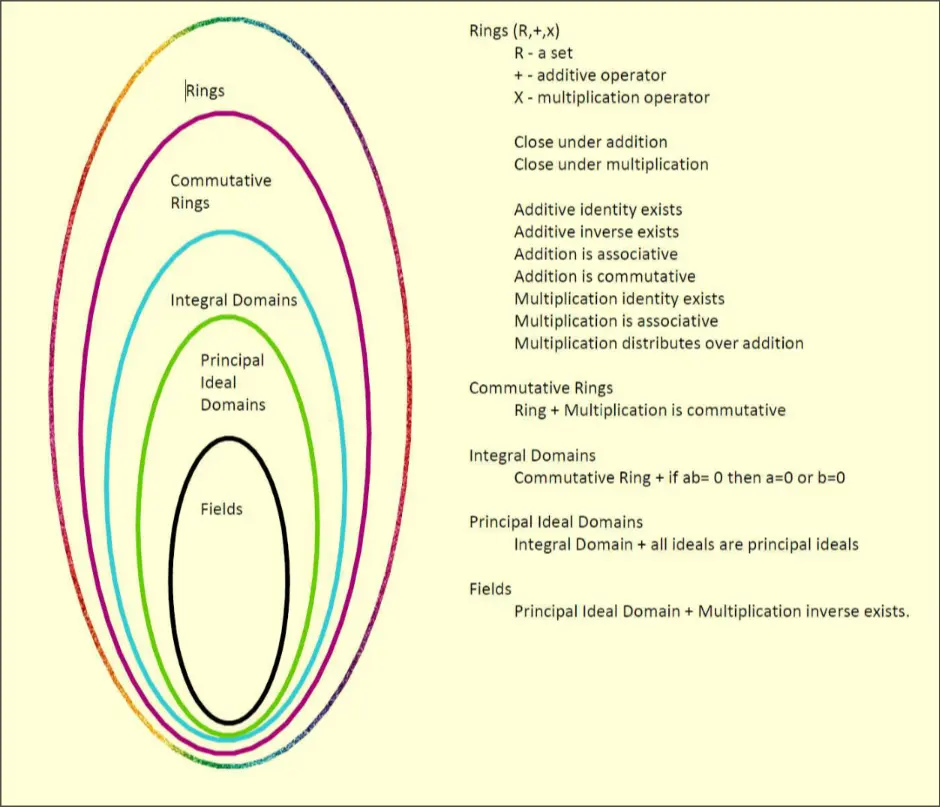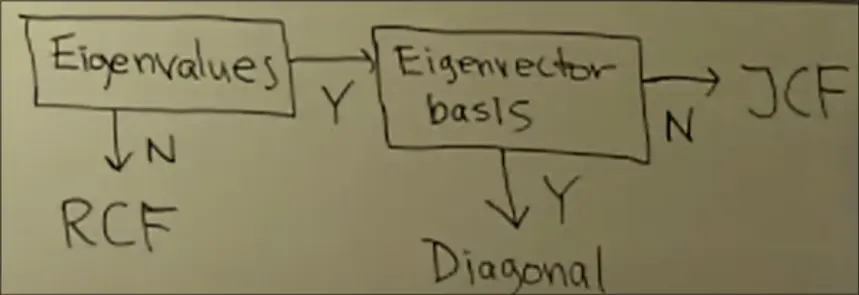Office Hours
- Wed 6:30pm - 7:30pm
- Fri 5:30pm - 6:30pm
Schedule

Notes
- All quizes based off homeworks
- Best 4/5 quizzes
- Quizzes start from week 3 in tutorial
- All computations should have whole numbers or Complex Number, but they should be easy
- 30% (4-6hrs per week) understanding basic defn, terms, computations. This is the most important
- 60% (1-2hrs per week) understanding problems from class and most homeworks
- 80% (1-2hrs per week) understanding what is presented
- Late submission policy after 4 days
- 30-40% of the assesments will be using the definitions, prove these basic properties…
Concepts
Week 0.1
- Field
- Integer Modulo n
- Finite Field
- Congruent Modulo
- Equivalence
- Modulus
- Uniqueness Field Properties
Week 1.1

- Ring
- Commutative Rings
- Integral Domain
- Principle Ideal Domain
- Euclidean Domain
- Additive Subgroup
- Ideal
- Field
Week 1.2
- Generator for Ideal
- Euclid’s Algorithm to find GCD
- Remainder Theorem
- Polynomial Ideal
- Vector Space
- Linear Combination
- Span
- Linear Independence
- Basis
Week 2
Week 3
- Swap Operator
- Permutation Notation
- Standard Basis Matrix
- Vector Space Isomorphic
- Ordered Basis
- Linear Operator
- Linear Mapping Between Two Ordered Basis Theorem
- Linear Transformations Closed Under Linear Combinations
Week 4
- Change of Coordinate
- Linear Functional
- Perpendicular Set
- Standard Inner Product
- Riesz Representation Theorem
- Annihilator
- Error Correcting Codes
Week 5
Week 6
- Transform Norm
- Matrix Norm
- Standard Inner Product
- Standard Inner Product for Vector Spaces
- Inner Products Define a Norm
- Polarization Identity
- Inner Product Space
Week 7
- Generalized Pythagorean Theorem
- Perpendicular Set
- Orthogonal Set
- Orthonormal Set
- Fourier Basis
- Orthogonal Sets are Linearly Independent
- Vector Represented by Projections
- Matrix Representation of Inner Product
- Inner Product from Matrix Representation
- Matrix Representation of Linear Map from Inner Product
- Gram-Schmidt Algorithm
- Orthonormal Set from Orthogonal Set Theorem
- Every Finite Inner Product Space has a Orthonormal Basis Theorem
- Best Approximation
- Orthogonal Projection
- Orthogonal Complement
- Orthogonal Projection onto Orthogonal Complement
- Inner Product Space as Direct Sum of Subset and Orthogonal Complement Theorem
- Bessels Inequality
- Orthogonal Subspace
- Change of Basis with Orthonormal Basis
Week 8
- Least Squares Method
- Least Squares Theorem
- Line of Best Fit Example
- Adjoint
- Matrix Representations of Linear Map with Respect to Orthonormal Basis
- Matrix Representation of Adjoints with Respect to Orthonormal Basis
- Hermitian Matrix
- Pauli Matrices
- Preserving Inner Products and Vector Isomorphism
- Unitary Operator
- Orthogonal Matrix
- Orthonormal Matrix
- Diagonal Operation
- Normal Operator
- QR Factorization
Week 9
- Complex Inner Product Space
- Superposition
- Quantum Operation
- Normal Operator
- Normal Matrix
- Upper Triangular
- Upper Triangular Matrices are Normal If and Only if They are Diagonal
- Invariant
- Invariant Under Adjoint
- Schur’s Decomposition
- Unitarily Upper Triangular
- Unitarily Diagonizable
- Spectral Theorem for Normal Operator
- Spectrum of a Matrix
- Spectral Mapping Theorem
- Relationship between Trace, Determinant and Eigenvaues
- The Spectrum of Unitary Operators on a Complex Inner Product Space lies on the Unit Circle
- Spectral Theorem for Unitary Operators
- Spectral Theorem for Unitary Matrixes
- Eigenvectors for Different Eigenvalues are Orthogonal for Symmetric Matrixes --- Midterm content ends here
- Polynomials over a Field
- Polynomial
- Polynomial Function
- Applying Polynomials to Linear Operators
- Polynomial Ideal
- Division Algorithm for Polynomials
- Fundamental Remainder Theorem
- Division Algorithm for Integers
- Reducible Function
- Reducible Polynomial
- FTOA
- Prime Factorization of Polynomials
- Fundamental Theorem of Algebra
Week 10
- Finitely Generated Polynomial Ideal
- Principle Polynomial Ideal
- Polynomial Ideal Fx is a Principle Ideal Domain
- Greatest Common Divisor of Polynomials
- Euclidean Algorithm for Integers
- Euclidean Algorithm for Polynomials
- Polynomial Field
- Finite Fields Have a Multiplicative Inverse
- Principle Ideal Domain Greatest Common Denominator Exists as Linear Combination Theorem
- Creating a Field from a Principal Ideal Domain
- Set Permutations
- Determinant
- Rotation Matrix
- Eigenvector
- Eigenspace
- Adjugate Matrix
- Block Diagonal Matrix
- Concatenating Ordered Set
- T-Annihilator
- Minimal Polynomial
- Cayley Hamilton Theorem
- Invariant
- Commuting Operators Provide Invariant Subspace
- Restriction Operator
- Invariant Subspaces Give Block Diagonal Matrix Representations
- Sum Characterization of Diagonalizable
- Conductor
- T-Conductor
Week 11
- Proper Subspace Can be Multiplied to Be Within Other Subspace Lemma
- Invariant Subspace
- Set of Triangular Matrixes
- Invariant Subspace Characterization of Triangularability
- Characterization of Triangularizability and Diagonalizability in Terms of the Minimal Polynomial
- Every Complex Operator is Triangularizable
- Determine if Matrix is Triangularizable or Diagonalizable
- Matrix Definition of Cyclic Subspace
- Block Diagonal Matrix
- Independent Subspaces
- Distinct Eigenvalues Imply Eigenspaces are Linearly Indepedent
- Projection
- Projections from Direct Sum Theorem
- Invariant Subspace Check using Projections
- Direct Sum of Linear Transformations
- Diagonalizable Properties Theorem
- Using Lagrange Polynomial to Compute Eigenspace
Week 12

- T-Annihilator of a Vector
- A Vector exists with T-Annihilator Equal to the Minimal Polynomial
- Primary Decomposition Theorem
- Cyclic Subspaces
- Companion Matrix
- Cyclic Decomposition Theorem
- Rational Canonical Form
- Jordan Form
- Jordan Basis
- Generalized Eigenvector
- Primary Jordan Form
- Diagonalizable Part of Triangular Matrix
- Nilpotent
- Every Triangular Matrix is The Sum of The Diagonal and Nilpotent
- Algebraically Closed Field